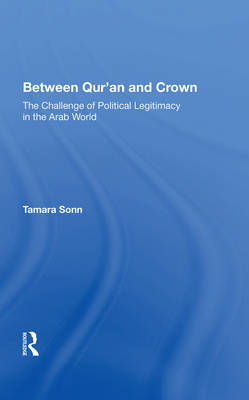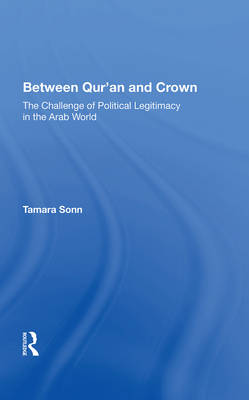
- Afhalen na 1 uur in een winkel met voorraad
- Gratis thuislevering in België vanaf € 30
- Ruim aanbod met 7 miljoen producten
- Afhalen na 1 uur in een winkel met voorraad
- Gratis thuislevering in België vanaf € 30
- Ruim aanbod met 7 miljoen producten
Zoeken
Between Qur'an and Crown
The Challenge of Political Legitimacy in the Arab World
Tamara Sonn
Hardcover | Engels
€ 195,95
+ 391 punten
Uitvoering
Omschrijving
The struggle for political legitimacy in many Middle Eastern countries today poses a dilemma for ruling elites. In order to maintain authority, leaders often must capitulate to Islamic universalist dogma, which may conflict with their own views of the state as well as threaten the legitimacy of other leaders in the region who are attempting to establish a secular, national basis for government. Tracing the roots of this dilemma in Middle Eastern history and Islamic philosophy, Dr. Sonn compares the contemporary Middle Eastern period to Europe's â oeAge of Religious Warsâ that preceded the emergence of the Western secular state. She describes how a process similar to the organic development of the secular state in Europe was interrupted in the Middle East by oppressive Western colonialism, which eventually led to the Muslim rejection of nationalism and all things â oeWesternâ and to the reassertion of Islam as the sole source of political legitimacy. The author shows how the philosophy of Islamic traditionalism opposes the two fundamentals of stable national political systems--a geographical limitation of authority and an institutionalized process for regular changes in leadership. Dr. Sonn bases her argument on an insightful examination of Middle Eastern history, from the formation and disintegration of the Ottoman Empire in the late nineteenth century to the present, and caps it with a detailed look at a possible solution to the dilemma: the teachings of modern scholars who advocate a new â oeIslamic realismâ incorporating a limited definition of national identity and interests while retaining Islamic social goals.
Specificaties
Betrokkenen
- Auteur(s):
- Uitgeverij:
Inhoud
- Aantal bladzijden:
- 280
- Taal:
- Engels
Eigenschappen
- Productcode (EAN):
- 9780367012182
- Verschijningsdatum:
- 7/06/2019
- Uitvoering:
- Hardcover
- Formaat:
- Genaaid
- Afmetingen:
- 148 mm x 229 mm
- Gewicht:
- 675 g

Alleen bij Standaard Boekhandel
+ 391 punten op je klantenkaart van Standaard Boekhandel
Beoordelingen
We publiceren alleen reviews die voldoen aan de voorwaarden voor reviews. Bekijk onze voorwaarden voor reviews.











